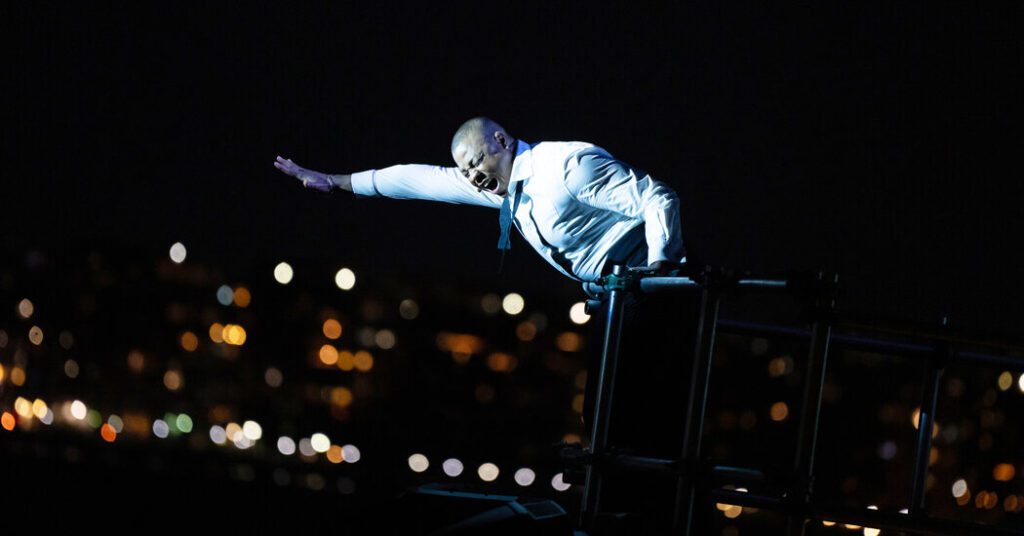“God gave me the voice that individuals need to hear,” Paul Robeson, the nice African American singer, actor and activist, informed the Black newspaper “The New York Age” in a 1949 interview.
Conscious of his powers and obliged by his affect, Robeson inserted himself into an extremely fraught second in American historical past. His highly effective advocacy for the rights of Black and working-class Individuals made him a hero, however his political leanings put him at odds with the prevailing anti-Communist forces in Congress, which ultimately impeded his profession. Robeson’s fame was international, nonetheless, and he had loads of alternatives overseas — till his U.S. passport was revoked as a result of he wouldn’t disavow membership within the Communist Social gathering in writing. He landed earlier than the Home Un-American Actions Committee (HUAC) in 1956, and though he was unafraid of being a lightning rod, he was wearied by it, too.
At the moment, the legacy of Robeson’s divine bass-baritone voice and its oratorial capaciousness has outlasted the political tarring and feathering. There isn’t any up to date analogue for Robeson, an artist in a classical medium who turned a family title and leveraged his fame to drive a public dialog round peace and justice. (Yo-Yo Ma, the beloved cellist who created the multicultural Silk Highway Mission, arguably comes closest, however with out the controversy.)
Davóne Tines, a bass-baritone himself, pays tribute to that legacy in “Robeson,” a brand new one-man present on the Amph on Little Island that weaves collectively snippets of Robeson’s phrases with songs related to him. On Friday evening, the simple enchantment of a popular-song recital collided with indirect, fractured references to Robeson’s life, cracking open a fictionalized glimpse into the emotional turmoil of a person who was seen as an impenetrable “titan,” as Tines put it. It was a vigorously performed, at instances irritating present, carried aloft by Tines’s fiery assurance.
Initially, the present’s construction appeared clear sufficient. Tines’s renditions of songs just like the labor anthem “Joe Hill,” which he delivered with assured smoothness, have been interspersed with Robeson’s phrases from newspaper editorials, tv interviews and onstage remarks. Wearing a Carnegie Corridor-ready tuxedo, Tines started with an admirable, if a bit woolly, vocal impersonation of the era-defining singer, emphasizing a deep properly of sound.
However for an artist like Tines, with a collaborator just like the director Zack Winokur, with whom he conceived the piece, straightforwardness is a feint. The 2 artists, abetted by the designers Adam Charlap Hyman (units) and Mary Ellen Stebbins (lighting) and the versatile instrumentalists John Bitoy and Khari Lucas, exploded their light re-enactment to discover the internal wrestle of a person recognized for equanimity. A deftly executed staging of Robeson’s reported suicide try in a Moscow resort room, set to a disturbing a cappella model of “Some Enchanted Night,” plunged the viewers and performers into the present’s paroxysmal coronary heart.
Belittling voices plagued Tines’s Robeson: The congressional panel at his HUAC listening to (“Did you make just a little speech?”) and Jackie Robinson’s restrained but reducing criticism (“If he needs to sound foolish,” stated the Corridor of Famer, “that’s his enterprise and never mine”). A multipartite model of the religious “Scandalize My Title” supplied the tour-de-force reply, passing by means of disco and wah-wah funk and culminating in an exhilarating breakdown with new strains added by Tines (“Cuz you gon’ mess up and also you gon’ discover out”). As he did in “The Black Clown,” Tines used style as a dramaturgical software, stitching Robeson right into a Black musical lineage, by which artwork is usually a medium to specific oneself joyfully and irrevocably below duress.
When he dropped the Robeson impersonation and commenced utilizing the lighter colours and textures of his pure singing voice, Tines was free to swing and soar. A daring falsetto pierced a Bach chorale, and the finale, which discovered Tines climbing a scale with growing depth in “This Little Mild of Mine,” introduced the viewers to its toes.
Clocking in round an hour, the present however introduced challenges for Tines’s emotionally invested and tightly managed model. He was extra snug in clap-and-snap gospel than intricate, R&B-style runs. The bottom notes have been ever so barely out of attain, and the emphasis on timbral breadth typically turned his singing gummy (“There Is a Balm in Gilead”), exaggerated or approximate.
As a coda, Tines sang “Outdated Man River,” a Robeson signature of problematic provenance. “That’s the previous man that I don’t need to be,” he intoned with a tweak to the lyric, stripping the tune of its hypnotic lilt in a driving interpretation that traded tokenization for reclamation.



